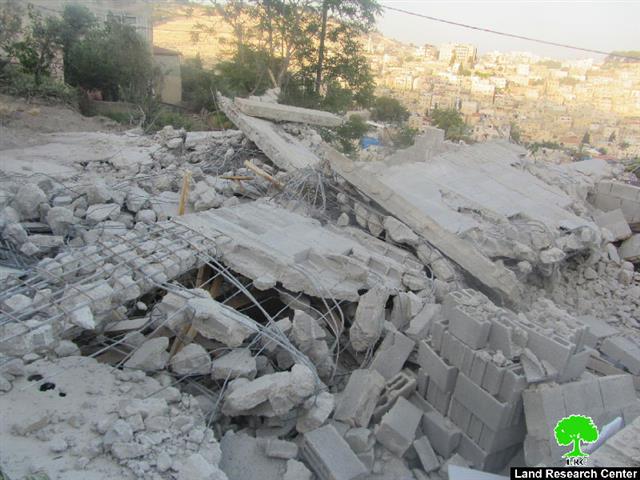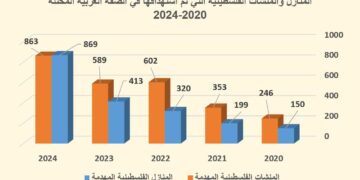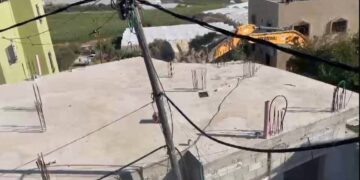The dozers of the Israeli occupation army on May 20, 2015 demolished a three story building in the area of Wad Qaddum in Jerusalem under the pretext of licensed constructions. Noteworthy, the structure is owned by Citizen Ahmad Abu Suneinih
Citizen Abu Suneinih told a researcher from Land Research Center the following:
“I started building my house on May 2015 as a business project. Due to the complicated procedures and the high expense the municipality of the occupation imposes on residents of Jerusalem, I decided to build the house without obtaining a building permit. The building is of three floors and is comprised of 8 residential apartments (120m2 for each). At time of building, a staff form the municipality of the occupation arrived to the location and delivered me a stop-work order under the pretext of “unlicensed construction”. I tried several times to obtain a building permit but the occupation never granted me one; therefore, I hired an attorney to object the demolition order”
He also said:
“A massive force from the occupation army accompanied by 2 dozers on May 20, 2015 demolished my building as per fulfilling a court decision that we were not informed about. Despite that my attorney filed a halt on the demolition order; the court ruled the building to be leveled. Noteworthy, the total finical loss is estimated of 1,000,000 INS”.
Land Research Center LRC sees that demolitions contradict with and violate all of the International conventions and Humanitarian laws including:
- Article 17 of the (1948) Universal Declaration of Human Rights stating: “Everyone has the right to own property alone as well as in association with others. No one shall be arbitrarily deprived of his property.”
- Section ‹G› of article 23 of the (1907) The Hague Conventions asserting: “In addition to the prohibitions provided by special Conventions, it is especially forbidden to destroy or seize the enemy's property, unless such destruction or seizure be imperatively demanded by the necessities of war.”
- Article 53 of the Geneva Fourth Convention (1948) declaring: “Any destruction by the Occupying Power of real or personal property belonging individually or collectively to private persons, or to the State, or to other public authorities, or to social or cooperative organizations, is prohibited, except where such destruction is rendered absolutely necessary by military operations.”
- Section 1, Article 11 of the International Covenant on Economic, Social and Cultural Rights (1966): “The States Parties to the present Covenant recognize the right of everyone to an adequate standard of living for himself and his family, including adequate food, clothing and housing, and to the continuous improvement of living conditions. The States Parties will take appropriate steps to ensure the realization of this right, recognizing to this effect the essential importance of international co-operation based on free consent."
Prepared by
The Land Research Center
LRC













